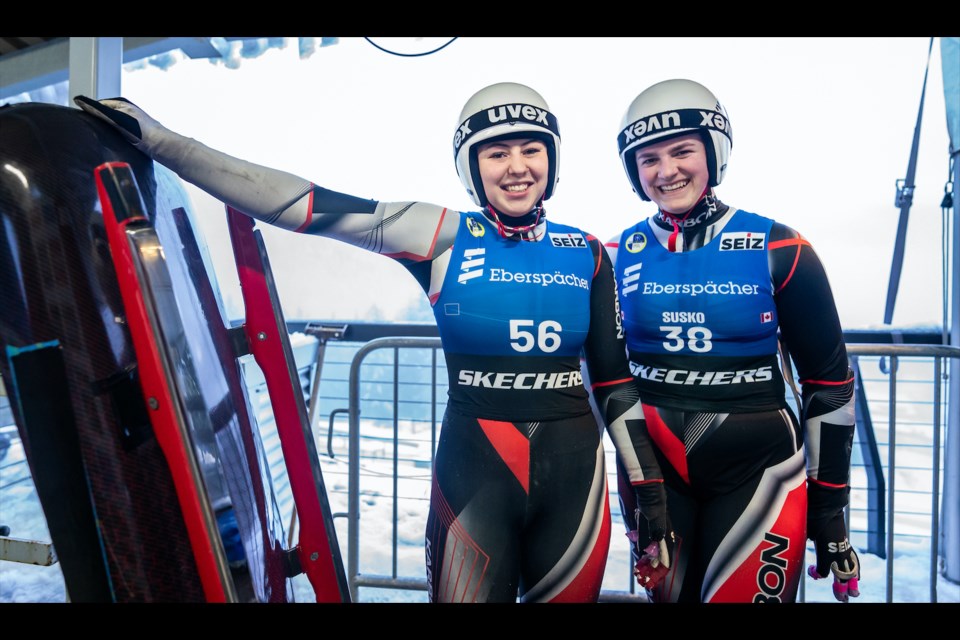As singles luge athletes, Embyr-Lee Susko and Beattie Podulsky want to beat each other. Yet they’re also good friends off the ice, which helped them to click quickly and smoothly as Canada’s new lead women’s pair. Both are pleased with their first World Cup doubles outing Dec. 15 on home ice: seventh place in a time of 1:18.920.
Susko also finished second in Nations Cup action the day before her doubles debut.
“It’s too good. My home track, all of my family and friends are here, it is so much fun,” said the Whistlerite in a press release. “[The fun] brings me back to when I first started sliding here, and it is pure bliss every time I come down the track. I’m loving it.”
Podulsky was likewise beaming on the finish dock after the fact. “It felt amazing,” she said. “It was really nerve-racking, but I am really happy that we were able to lay down two really good runs. It was awesome to be here and represent Canada in women’s doubles.”
Germany grabbed the top two spots on the podium. Jessica Degenhardt and Cheyenne Rosenthal won gold (1:18.371), while Dajana Eitberger and Saskia Schirmer slid to silver (1:18.451). Italy’s tandem of Andrea Voetter and Marion Oberhofer stopped the clock at 1:18.466 for bronze.
Susko and Podulsky were just four years old when the Whistler Sliding Centre (WSC) hosted the 2010 Olympics, but have found immediate chemistry since they paired up five weeks ago.
On Friday, their bond was on full display atop the world’s fastest track.
“We just trust each other. I trust her to get us down, and she trusts me to save it when needed,” remarked Podulsky, who is from Calgary. “It is really good teamwork and friendship we got going here, and it really helps me with my mind at the top before heading down the track.”
The two 18-year-olds leaned on each other to shake off pre-race jitters and throw down veteran runs in contention against many of the world’s best. In the process, they continue to make necessary adjustments.
“The difference between [sliding doubles from singles] is like driving a semi-truck to driving a sports car,” explained Susko in a release. “It’s very big and wide and maneuvering the sled, so it is very different. We have different ways to move back and forth from singles to doubles and it has been a lot of fun for me.”
Figuring it out
Canada’s men’s doubles specialists, Devin Wardrope and Cole Zajanski, found themselves in 12th after a two-run time of 1:18.046.
The Calgarians are still familiarizing themselves with a new set of gear, even as they try to find the fastest possible line each time out.
“For us personally, [we’re] figuring out new equipment,” Wardrope revealed. “We're on some new stuff, testing out some new things, and it's a big change from last year, but we're definitely ready for it.”
“It's nice to have our 15 minutes of fame, having all the attention as the only men’s doubles sled [for Canada],” added Zajanski. “Whistler’s our home track, so it’s the most comfortable place on tour for us.”
The Germans prevailed in men’s doubles as well. Tobias Wendl and Tobias Arlt claimed victory (1:17.300). Austria’s Thomas Steu and Wolfgang Kindl stopped the clock at 1:17.378 in second, while Hannes Orlamuender and Paul Gubitz found enough speed for bronze (1:17.405).
Years ago, Wardrope and Zajanski pushed Canadian standouts Tristan Walker and Justin Snith hard for a berth at Beijing 2022. With Walker and Snith now retired, the time has come for the youngsters to seize their moment.
Men's singles
Theo Downey passed his first World Cup test, clocking a solid 17th-place time of 1:41.920.
“It feels awesome. Making my debut in senior sliding with a top-20 in the big leagues, there is not much to complain about,” said the Calgary native in a release, who was third in Junior World Cup action one week ago. “I had very consistent runs in the junior competitions, so I just tried to carry that over this week.
“It’s a privilege to be up there sliding with the big guys of the sport. They are really good so to be around them was awesome. I definitely will take away that I can put down solid runs at this level. I’ll keep cleaning up my runs and continue to get my head back and go faster.”
Max Langenhan clocked the top time in both heats to snatch another gold for Germany (1:40.093). Austria’s Jonas Mueller was the runner-up (1:40.348), and Latvia’s Kristers Aparjods earned third (1:40.572).
Dylan Morse wound up 20th as the second male Canadian sled (1:42.164), but climbed four spots after his second run.
Full results are available at https://www.fil-luge.org/en/multimedia/eberspaecher-world-cup-2.




